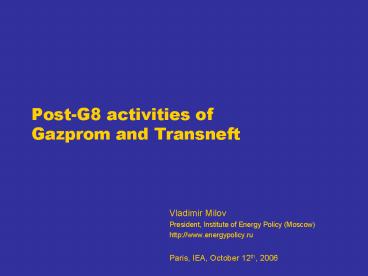PostG8 activities of Gazprom and Transneft
1 / 20
Title:
PostG8 activities of Gazprom and Transneft
Description:
Map: BAPLINE. The issue of upstream underinvestment and possible gas shortages in Russia. Physical shortages of gas supplies to Russian power stations during Jan. ... –
Number of Views:104
Avg rating:3.0/5.0
Title: PostG8 activities of Gazprom and Transneft
1
Post-G8 activities ofGazprom and Transneft
- Vladimir Milov
- President, Institute of Energy Policy (Moscow)
- http//www.energypolicy.ru
- Paris, IEA, October 12th, 2006
2
Gazproms activities
3
Sakhalin-2 situation
- PSA as such is not under attack
- Again, this is a case of Government using
regulatory powersin arbitrary manner in order to
provide competitive advantage toaffiliated
companies (Gazprom) - Another example was September 2004, when MNR
threatened torevoke Yuganskneftegaz licenses.
After takeover, all claims hadvanished - In particular Sakhalin-2 case, Gazprom-Shell
negotiationsapparently had stuck, so Gazprom was
forced to use theGovernments asymmetric support
4
Are environmental issues really a concern?
- Projects pursued by Russian state energy
companies (Gazprom, Transneft) are associated
with bigger concerns East Siberian oil
pipeline, Baltic and Altai gas pipelines - Other approach could have been negotiations and
joint efforts with the investor in order to
improve environmental record of the project, not
the termination of environmental permit - The fact that the environmental claims occur at
the same time when Gazprom is seeking project
entry on favorable conditions (same as with
Yuganskneftegaz license withdrawal threats in
2004) does not raise the reputation of the
Russian authorities
5
Development of South Russkoye and Zapolyarnoye
(neokom) gas fields
- The swap scheme just doesnt work out
- Key problem issues
- Fair access to governance of Western Siberian
JVsfor IOCs (operational, investment, marketing
solutions). As its clear after Rosnefts IPO,
Russian Governmentand state corporations do not
really wish to give awaycontrol with equity - Sustainability of wellhead purchase prices by
Gazprom - Access to pipeline
- Blocked access to exports
6
The new Russian law on gas exports
- Nothing new, but
- Gazprom had been enjoying a de-juro export
monopoly for14 years. Why now? - Apparently the law was targeted to block LNG
exports fromSouth Tambey field, a private
project. The draft law was introducedon the same
day as Gazprom had publicly announced
thatTambeyneftegaz is a problem asset - It appears that Gazproms lobbyist capabilities
are now farstronger than those of Yukos years
ago - The law actually puts Gazprom in a legally
vulnerable position,as competition regulators
may now consider legal claims againstmonopolized
gas supplies from Russia
7
Whats the trouble with Altai pipeline?
- Pipelines from Western Siberia to Altai feature
small capacity, not enough to ensure gas supplies
to China in preliminarily agreed volumes - Besides, Omsk, Novosibirsk and Altai regions
consume large part of gas currently transported
through these pipelines - Therefore, it would be not enough just to build a
short route to chinese border to ensure supplies
a new, large-scale pipeline from Western
Siberia is required
Surgut-Omsk-Novosibirsk pipeline capacity 5 bcm
Novosibirsk-Barnaul-Biysk pipeline capacity 1,7
bcm
Map Tomsktransgaz
8
Sino-Russian energy relations
- Most Chinese energy demand is located in South
Eastern areas -land pipelines from Russia no
solution - Chinese net gas imports will not grow
significantly (IEA forecasts60 bcm by 2030),
most of it will be satisfied through LNG - Sakhalin-2 LNG is already contracted with other
countries - Price negotiations on supplies through Altai
pipeline prove to benot less tough than Kovykta - Russian authorities are reluctant to Chinese
access to significantupstream assets - Oil supplies under 2001 agreement (0.6 mbd from
2010)remain the only solid option
9
Shtokman field development
- Continuing bargaining inside Gazprom on where the
gas would go as LNG or via pipeline through
NEGP (presumably as Putin had announced in Paris
in September 2006) - How the project will be financed? (If Gazprom
holds 50 equity share, equity financing of the
project appears highly questionable) - Will a PSA be allowed?
- Its not politics, its clumsiness
10
The North European gas pipeline
Map Wintershall
- As we had predicted, Gazprom had substantially
raised cost estimate of the project in April
(from USD 5bn to USD 10.5 bn, even without the
reconsideration of the marine part costs so far) - Resource base of the project remains questionable
11
Transnefts activities
12
Eastern Siberia oil pipeline project
Map Transneft
- After Putins order to move the pipeline way up
North (April 2006) no revised feasibility study
had been available yet - In August 2006, Sberbank had signed a RUR 65bn
(USD 2.4bn) credit line agreement with Transneft
to finance the pipeline construction
13
Black Sea rim
Map BAPLINE
- Further economics of Burgas-Alexandropolis is
questionablehot money leads to careless
investment decisions - Russian authorities appear to be quite jealous of
the plans ofENI/Calik Energy to build the
Samsun-Ceyhan oil pipeline
14
The issue of upstream underinvestment and
possible gas shortages in Russia
15
Physical shortages of gas supplies to Russian
power stations during Jan.-Feb.2006
Source Russian Unified Energy Systems
16
Where Gazprom had been investing in the previous
years?
Cumulative capital investment by Gazprom in
2000-2006, USD bn (money of the day)
Source Institute of Energy Policy, Gazprom data.
- Gazprom estimate
17
New planned non-gas acquisitions...
- 50 equity share in TNK-BP (USD 20-25bn)
- Acquisition of a control equity share in
Mosenergo (USD 2.1bn) - What else?...
18
Can Gazprom convert extra revenues into
investments?
Gazproms revenues, expenses and profits,
31.12.2005 to 31.12.2000
In 2001-2005, Gazproms inefficiency and growth
of expenses had largely eroded the investment
opportunities provided by strong growth of
revenues
Source Gazprom data IFRS financial reports
19
The need to urge Russian Government to return to
gas sector restructuring is inevitable.Gazprom
can not sustain necessary gas supplies to Russian
and European customers
20
Is Europe that dependent on Russian gas?
Share of gas imports from Russia in primary
energy consumption, 2005
Source BP Statistical Review of World Energy
2006 (primary energy consumption), Gazprom (gas
imports by relevant countries)































